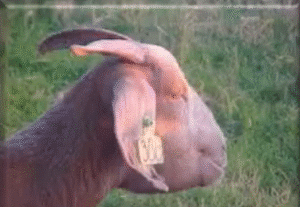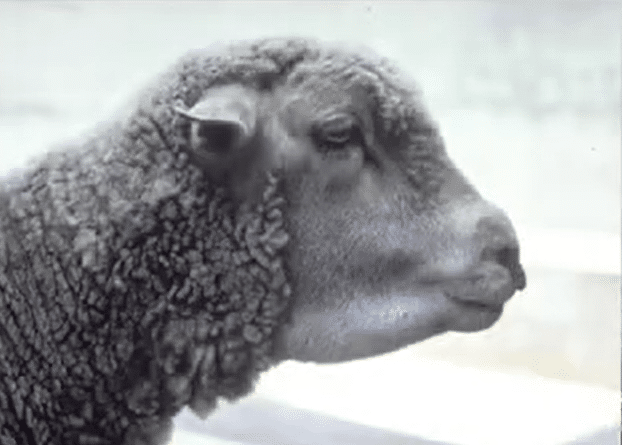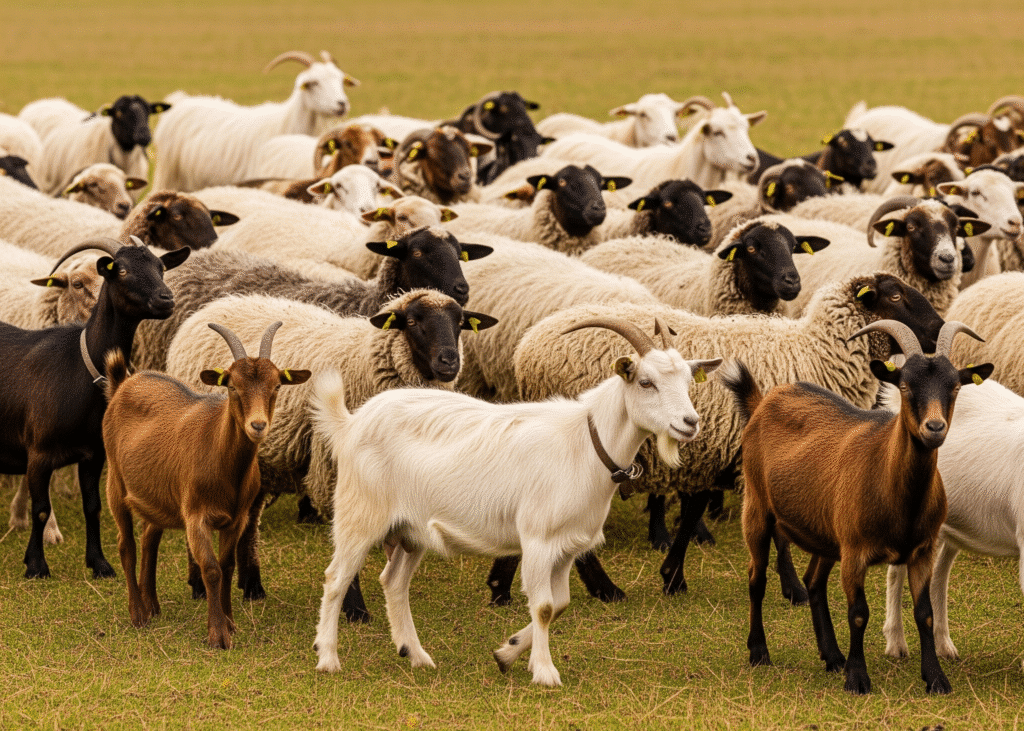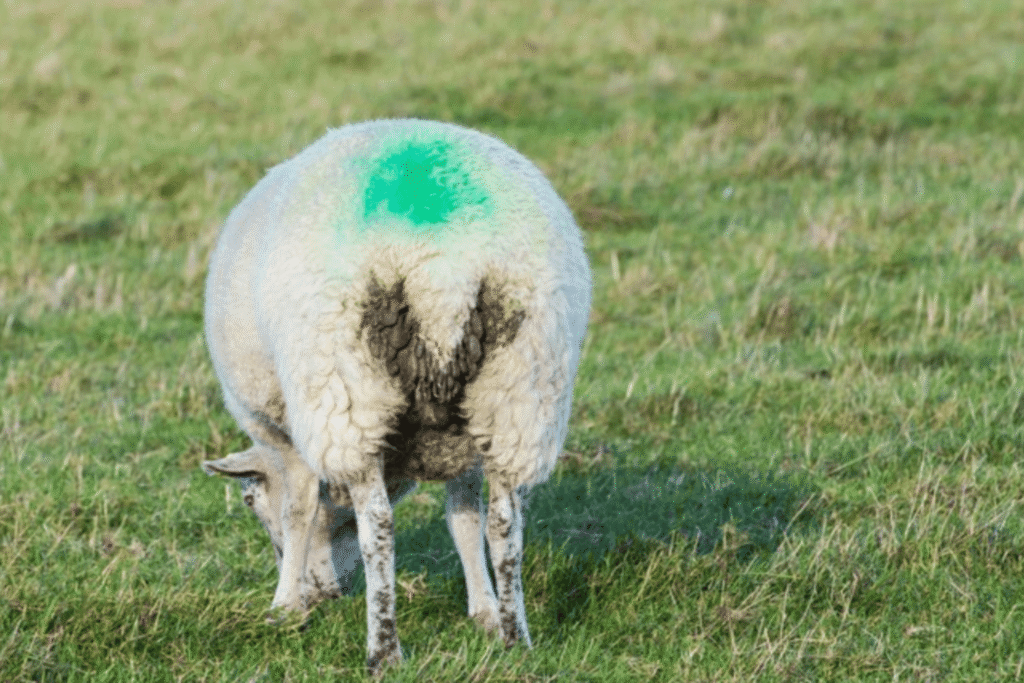Bottle jaw is a condition seen in sheep and goats where soft swelling develops beneath the lower jaw due to a buildup of fluid (oedema). It is not a disease but symptoms of loss of red blood cells. Bottle jaw most often caused by parasites such as liver fluke (Fasciola hepatica) or barber’s pole worm (Haemonchus contortus). This Parasites like fluke (Fasciola hepatica) effect the liver which reduce the production of important blood protein. while barber’s pole worm feeds on blood in the stomach, causing severe anemia. Both lead to a drop in albumin (a key blood protein), allowing fluid to leak into tissues under the jaw.
The condition can appear suddenly, especially during warm and wet seasons when parasite activity is high. Affected animals often show signs such as swelling under the jaw, pale eyes and gums, weakness, weight loss, and in severe cases, sudden death. Bottle jaw is a warning sign of serious internal problems and should never be ignored. Early diagnosis through faecal tests or blood tests, along with appropriate deworming and veterinary guidance, is essential to control the parasites and prevent further losses in the flock or herd.
Animal’s Farming is a platform that provides information about various animal diseases, including their causes, symptoms, treatment, and prevention. Let’s dive into bottle jaw disease in goats and sheep.
Symptoms of Bottle Jaw in Goats and Sheep
The most noticeable sign of bottle jaw is a soft, cool, and fluid-filled swelling under the lower jaw, also known as submandibular edema. The swelling may feel squishy or pitting when pressed, and in severe cases, it can extend down toward the throat area. This swelling often appears more prominent later in the day when the animal has been grazing with its head down, as gravity causes fluid to pool in the loose tissues beneath the jaw. In the early morning, the swelling may temporarily appear reduced, giving a false impression of improvement.
jaw, also known as submandibular edema. The swelling may feel squishy or pitting when pressed, and in severe cases, it can extend down toward the throat area. This swelling often appears more prominent later in the day when the animal has been grazing with its head down, as gravity causes fluid to pool in the loose tissues beneath the jaw. In the early morning, the swelling may temporarily appear reduced, giving a false impression of improvement.
Along with swelling, animals suffering from bottle jaw typically show signs of anemia and general weakness. Their gums and inner eyelids become pale to white, which can be quickly assessed using the FAMACHA scoring system. Affected goats and sheep may become lethargic, tire easily, and show reduced interest in feed. Weight loss, poor body condition, and rough or dull hair coats are common as the animal’s body struggles to absorb nutrients properly due to internal parasitic damage.
Cause for Bottle Jaw in Goats and Sheep
Parasites such as liver fluke (Fasciola hepatica) or barber’s pole worm (Haemonchus contortus) are main cause of bottle jaw. Bottle jaw in goats is severe anemia resulting from heavy infestations of barber’s pole worms (Haemonchus contortus) — a type of blood-sucking internal parasite. These worms live in the abomasum, which is the goat’s true stomach, and attach themselves to the lining using small teeth. They pierce the stomach wall, creating tiny wounds that bleed, and feed directly on the goat’s blood. While a small number of worms may not cause noticeable harm, a large infestation can lead to significant blood loss over time, resulting in severe anemia and low blood protein levels.
As the goat’s red blood cells and proteins (especially albumin) are depleted, the blood can no longer hold fluid properly within the vessels. This causes fluid to leak out and accumulate in the loose tissue under the lower jaw, forming the characteristic swelling known as bottle jaw. If the anemia worsens and the worms continue to feed, the goat’s body cannot replace blood cells quickly enough, leading to weakness, pale eyelids, and potentially death if untreated.
It’s also important to note that barber’s pole worm infestations usually do not cause diarrhea. If your goat shows both bottle jaw and diarrhea, the cause may be another internal parasite, such as liver fluke or a digestive infection. Environmental conditions like warm, wet weather and overgrazed pastures can increase the risk of infection, as they allow worm larvae to thrive and spread easily among grazing goats.
Treatment of Bottle Jaw in Goat and Sheep
If bottle jaw is suspected in goats or sheep, immediate veterinary consultation is essential to identify and address the cause. The primary treatment of bottle jaw involves the execution of internal parasites, including liver fluke, using effective anthelmintics such as macrocyclic lactones and specific flukicides like triclabendazole.
In cases where a nutritional or protein deficiency contributes to the condition, your veterinarian may recommend protein-rich feed supplements and balanced animal feed additives to support recovery.
In severe cases, fluids and electrolytes may be administered intravenously to stabilize the animal.
It is important to note that Johne’s disease is untreatable, while lymph node abscesses are generally best left untreated. If the cause is related to salivary gland blockage, treatment may include gentle massage and the removal of grass seeds or other obstructions from the salivary duct openings under the tongue or inside the cheek.
Supplements Used in Bottle Jaw
When you recognize that your sheep is not feeling well and also shows symptoms of bottle jaw, at an early stage you can use supplements to prevent your goat or sheep from becoming weak, or you can also start supplements afterward to help the animal recover faster. As bottle jaw decreases the number of red blood cells in the animal, vitamin B12 is a must for the animal. There are a few more; let’s discuss each one separately.
Vitamin B12 Supplements for Goat and Sheep in Bottle Jaw Disease
Vitamin B12 is a supportive supplement that increases the production of red blood cells, which fight anemia, one of the common symptoms of bottle jaw in goats and sheep. It also supports the animal’s energy recovery, weight gain, and appetite.
- Kaeco Vitamin ADE B12 Oral Gel is one of the best B12 vitamin supplements for goats and sheep.
- Rooster Booster B-12 Sheep and Goat Liquid, 32-Ounce, is also good for vitamin B12.
- Growel Agrovet Growvit Power Multivitamin: Here you will get some other beneficial vitamins for the animal too. In Growel Agrovet, you will get Vitamin A: 120,000 IU, Vitamin D3: 60,000 IU, Vitamin E: 500 mg, Vitamin B12: 200 mcg, Selenium: 100 ppm, Biotin: 0.50 mg, Lysine: 100 mg, Choline: 100 mg, Methionine: 100 mg.
Electrolytes
Electrolytes help animals to rehydrate and support the animal’s system, especially if they are not drinking well. Here are a few of the best electrolytes for goats and sheep.
- PFIZER ANIMAL HEALTH 8142 Resorb Electrolyte Packet, 64g
- Widely used oral electrolyte for ruminants.
- Contains sodium chloride, potassium chloride, sodium acetate, and dextrose.
- Helps restore fluid and electrolyte balance; supports energy metabolism.
- Bounce Back® Electrolyte (Manna Pro)
- For cattle, sheep, and goats.
- Provides sodium, potassium, chloride, and glucose to replace lost electrolytes.
- Often used after illness, stress, or transport.
- Sav-A-Caf® Electrolytes Plus
- Powdered oral electrolyte for young ruminants.
- Contains dextrose for energy and electrolytes for hydration.
- Vytrate® Oral Rehydration Solution
- A veterinary-grade electrolyte powder for calves, lambs, and kids.
- Includes sodium, potassium, glycine, and dextrose to promote rehydration and intestinal recovery.
- Hydra-Lyte® or Rehydion® Gel (various brands)
- Concentrated oral electrolyte gels used when animals are not drinking enough water.
- Useful for small ruminants like goats and sheep that resist drinking.
Prevention of Bottle Jaw in Goat and Sheep
Parasites are the main cause of bottle jaw in goats and sheep. Prevention of bottle jaw is possible by managing parasites, providing a clean and healthy diet, and maintaining hygiene. The best way to protect your herd from bottle jaw is deworming, providing enough nutrition, and also separating new animals to prevent the spread of this in the herd.
Conclusion of Bottle Jaw Disease in Goat and Sheep
Bottle jaw in goats and sheep is not a disease itself but a serious symptom of underlying health issues, most commonly caused by internal parasites such as liver flukes and barber’s pole worms. These parasites lead to anemia and loss of blood proteins, resulting in the characteristic swelling under the jaw.
Early detection and prompt veterinary intervention are crucial for successful treatment. Regular deworming, maintaining proper nutrition, and ensuring clean, parasite-free pastures are the best preventive measures. Supportive care with vitamin B12, electrolytes, and protein-rich supplements can help affected animals recover faster.
By practicing good herd management, routine parasite control, and close health monitoring, farmers can effectively prevent bottle jaw and protect the overall productivity and well-being of their goats and sheep.
FaQs: Bottle Jaw in Goat and sheep
What is bottle jaw in goats?
Bottle jaw is a condition seen in sheep and goats where soft swelling develops beneath the lower jaw due to a buildup of fluid (oedema). Bottle jaw is not a disease but symptoms of loss of red blood cells.
What causes bottle jaw in goats?
Bottle jaw most often caused by parasites such as liver fluke (Fasciola hepatica) or barber’s pole worm (Haemonchus contortus).
How to cure bottle jaw in goats?
Cure involves deworming with effective anthelmintics, improving nutrition, and treating anemia with vitamin B12 and iron supplements under veterinary supervision.
How to treat bottle jaw in goats?
The primary treatment of bottle jaw involves the execution of internal parasites, including liver fluke, using effective anthelmintics such as macrocyclic lactones and specific flukicides like triclabendazole.
In cases where a nutritional or protein deficiency contributes to the condition, your veterinarian may recommend protein-rich feed supplements and balanced animal feed additives to support recovery.
What does lice look like on goats?
Goat lice are small, flat, wingless insects that may appear white, gray, or brown. They move through the hair and cause itching, hair loss, and skin irritation.
What causes swelling of the jaw?
Swelling of the jaw can be caused by parasites, infections, abscesses, salivary gland blockage, or injuries. In goats, it’s often due to anemia from internal parasites.
How to treat an anemic goat?
Provide iron and vitamin B12 supplements, high-protein feed, clean water, and treat the root cause—usually parasites—with proper deworming.
What causes a swollen jaw?
A swollen jaw may result from parasite infection, injury, abscess, or fluid buildup due to low blood protein. In livestock, it’s often linked to internal parasites.



